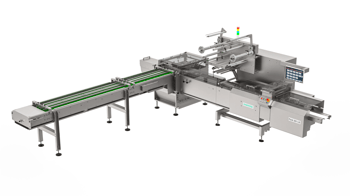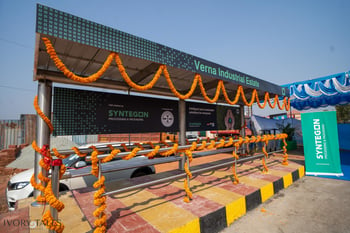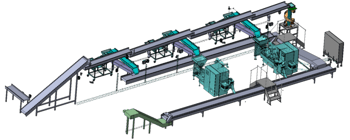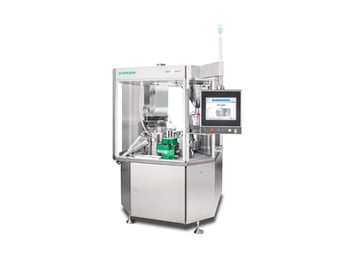Commissioned by the Indian government, Klenzaids has established the first mobile biosafety level 3 laboratory in a bus under the name of BioKlenz® in India. It will enhance the early detection of pathogens and their fast control – even in the most remote locations.
As the Covid-19 pandemic has shown, countries like India with a large population with very remote habitations need a more flexible approach to virus control. To date, stationary biosafety level 3 (BSL-3) laboratories depended on samples from partially distant locations – a challenging task which often leads to delays in diagnostics. However, it is critical to detect emerging pandemics or epidemics at an early stage. Handling viral pathogens in high-level bio-decontamination facilities is becoming more and more important.
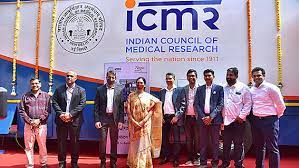
Team Klenzaids with Dr. Bharati Pawar, Union Minister of State for Health & Family Welfare, Government of India.
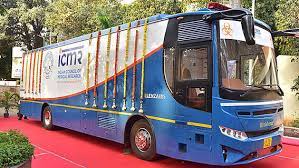
Commissioned by the Indian government, Klenzaids has established the first mobile biosafety level 3 laboratory in a bus under the name of BioKlenz® in India. It will enhance the early detection of pathogens and their fast control – even in the most remote locations.
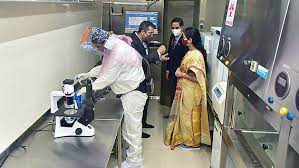
Hamish Shahani, CEO of Klenzaids CEO explaining function of the laboratory to Dr. Bharati Pawar, Union Minister of State for Health & Family Welfare, Government of India and Dr. Balram Bhargava, Secretary Department of Health Research & Director General, Indian Council of Medical Research (ICMR)
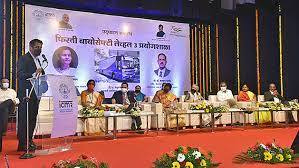
Hamish Shahani, Klenzaids CEO speaking during the inauguration of first mobile biosafety level 3 laboratory in a bus under the name of BioKlenz® in India.
Get inspired with regular updates on technologies and services, case studies, webinar offers and events.

The power of Klenzaids
This is where Klenzaids, manufacturer of benchmark Aseptic, Bioclean and Containment equipment steps in: the Indian Council of Medical Research (ICMR) teamed up with Klenzaids to design and build the first mobile BSL-3 laboratory in India, aka BioKlenz®, which was inaugurated on February 18, 2022 by the Union Minister of State for Health and Family Welfare, Government of India. Since the same team had already been involved in building Asia’s first BSL-4 lab at the National Institute of Virology, the reasons for turning to Klenzaids were obvious. The most important assets of the new BioKlenz® BSL-3 laboratory: it functions like a normal bus; it is completely self-sufficient and can even be driven to hard-to-reach locations. The lab in the bus is up and running within no time; no additional equipment is needed.
The lab in the bus is airtight, access-controlled, and fitted with safe change HEPA filters, as well as a biological liquid waste decontamination system and can be bio-decontaminated using vaporized H2O2. It features an intelligent control automation system, which maintains the working environment under negative air pressure, and records all necessary data. The lab also has a GPS system and CCTV cameras, which always provide its live location.
The future of mobile lab systems
As per government agreement, Klenzaids shall manage the infrastructure and the overall engineering, maintain and operate the bus. ICMR’s nominated institutes shall conduct the science and research of infectious diseases. In the future, a network of such mobile bus laboratory systems is planned for quick detection and containment of epidemics caused by high-risk pathogens, even in the remotest areas of India. “This is another proud milestone for the Indian health system and Klenzaids,” says Hamish Shahani, Managing Director and CEO of Klenzaids. “We very much hope that other countries will follow suit.”
Further information
Leading Indian media have reported on this ground-breaking development:
- https://www.cnbctv18.com/healthcare/union-minister-bharati-pawar-inaugurates-indias-first-bsl-3-mobile-lab-in-nashik-12547412.htm
- https://theprint.in/india/indias-first-biosafety-level-3-mobile-lab-launched-in-nashik/837494/
- https://news.abplive.com/news/india/india-s-first-biosafety-level-3-mobile-lab-launched-in-nashik-will-help-scientists-in-investigating-outbreaks-know-details-1514026

